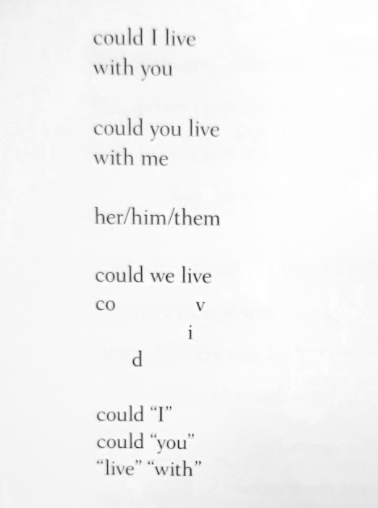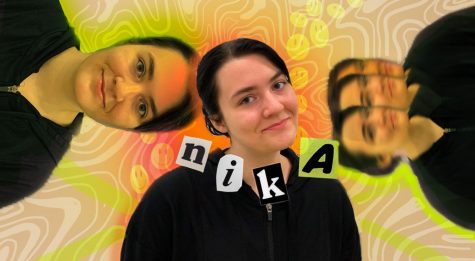Why Modern Poetry is Terrible and How We Can Change It

Excerpt from Maureen N. McLane’s “Conditional”
February 11, 2022
In the twenty-first century, poetry has been reduced to atrociously unrelated sentences with line breaks. Society has apotheosised low-grade writers like Rupi Kaur only because their works are accepted under the guise of being uniquely diverse and progressive. Modernists claim that the quantity of new voices in poetry is amazing, but they fail to look into the quality of these new voices. There is a reason as to why most forms of contemporary poetry are truly dull, vapid, and overly pretentious.
Firstly, there are not any less good writers today than there were back in the nineteenth century. It is that the younger population is not being educated to write as well as they can. In the modern age, students are taught to write only about themselves and their identities. As Jonathan Graham from The Federalist puts it, “If people have to care about you before they care about your art, your readership is going to be small indeed.” Most younger writers who try to write confessional narrative poetry are self-absorbed and are focused on insular experiences that only concern themselves. It is in the educator’s power to enlighten generations with exemplary poetry that captures history and to make their students learn exactly why these works persist through the ravages of time.
Secondly, there is no openly direct criticism because society does not want to offend a writer’s “individuality” or “style.” This justifies the horrific grammar, vocabulary, and punctuation which often accompanies their work. As a result of this, people want to be writers and not readers. Society has lowered standards for what is considered adequate and this practice rewards bad poetry. There is no iconic work that is memorable from all of these new-age authors that do not even bother to use capitalization. True poets aspire to perfection, but modern poets aspire to glory and fame.
When learners are told that there are no rules to poetry, this type of work results. There is a small range of subject matter in these works and they do not encompass a broad topic that the audience can relate to as a whole. Unsurprisingly, the content of these poems turns out to be mass-culture inspired and intensely unoriginal. This monotonous mainstream poetry only manages to capture general sentiments and describes life within a mundanely capitalistic environment. Moreover, these works are written with vernacular diction that does not aspire to embody grand and complex concepts in the world. Writers should be shown why authoring obscenely juvenile poetry about first-world problems and identity politics will not earn their poems a place in history.
Structured and classic writing will endure for centuries while talentless books like Milk and Honey will be forgotten in the dustbin of time. Poets should be taught to make their poetry last for ages, instead of only writing for themselves.



Amara • Oct 12, 2024 at 6:06 pm
I am currently preparing to enter a slew of poetry competitions, so I did what I always do by reading the work of all of the previous winners. My goodness, was I shocked at the absolute garbage that many of these publications allow to be awarded top prizes. The current state of poetry is so sterile, lawless, and lazy. Much of what I have read cannot be considered poetry, to be frank. This concept of writing random, shapeless, meaningless words that are barren of any thematic or emotional reliability is a pandemic. I think the problem is that reading is becoming irrelevant to our society. I am not even 40 yet, but I was taught Keats and Auden and Walcott, and Shakespeare was mandatory in my curriculum. I was encouraged to read and write my own poetry in school at an early age. I was also encouraged to read outside of my immediate culture and environment, so I was able to appreciate works by Anita Desai and Marlon James, for example. This article perfectly exhibits precisely what is wrong with modern poetry, and it really breaks my heart.
Niall O'Connell • Aug 14, 2024 at 5:06 am
‘Firstly, there are not any less good writers today than there were back in the nineteenth century.’
It’s FEWER!
Sorry, couldn’t help myself, especially in light of the point you were making. Otherwise great article!
Keith Yeatts • Aug 1, 2024 at 9:21 pm
This article is a good summary of the current state of ‘popular’ poetry. The major malaise we find our collective ethos in was exacerbated by Robert Zimmerman winning the Nobel Prize for literature. A complete travesty. However – there are still several serious poets writing today: René Galvan, Jeffrey Collins and others (S. K. Yeatts). In 100 years, all the Instagram poets and those who are focused on topics of race, gender and politics will be long forgotten. T.S. Eliot, the T’ang Dynasty poets, Tomas Tranströmer, Garcia Lorca, Georg Trakl, and Ingeborg Bachmann will still be in print and revered. A few decades of shallow thoughtless writers will never be able to ruin a beautiful and immortal poetic art form.
Timmy • Jul 28, 2024 at 7:48 pm
Wow, this is accurate! Why would I want to read about someone’s feelings constantly, lyrical or otherwise? How bloody boring!
Is it not about the poem, and not the poet?
It is really something to claim you are “America’s top lyric poet” though!
Rachel • Sep 14, 2024 at 2:42 pm
I quite love it, but this is coming from someone from a psychology background 🙂
Leah • Jan 16, 2024 at 12:46 pm
Thank you for this. Milk and Honey might be one of the worst books I’ve ever set eyes on. People seriously don’t know what poetry is anymore. Ashamed to be born in this generation
Ron Bell • Dec 6, 2022 at 6:23 pm
I am elated that someone has finally offered an accurate synopsis of the doggerel that is being lauded and finding its way into print. For example, Brazil’s Adala Prada is highly touted internationally, yet one of her poems ends by staying “the anus(she used the vulgar term for this part of the anatomy, not anus) is beautiful.” How under the sun does such drivel quality one as a leading poet, be it in Brazil or Benin? Many thanks for the insight into what is being passed off as poetic literature nowadays. I call it garbage.
Joseph Charles MacKenzie • Aug 4, 2022 at 8:30 am
As America’s top traditional lyric poet, I applaud The Tower for its perfectly well-reasoned assessment of modern so-called “poetry.” I hope readers will consider looking into my efforts to restore traditional lyric poetry, an example of which can be found here: https://www.youtube.com/watch?v=s5SU8vlzQZo